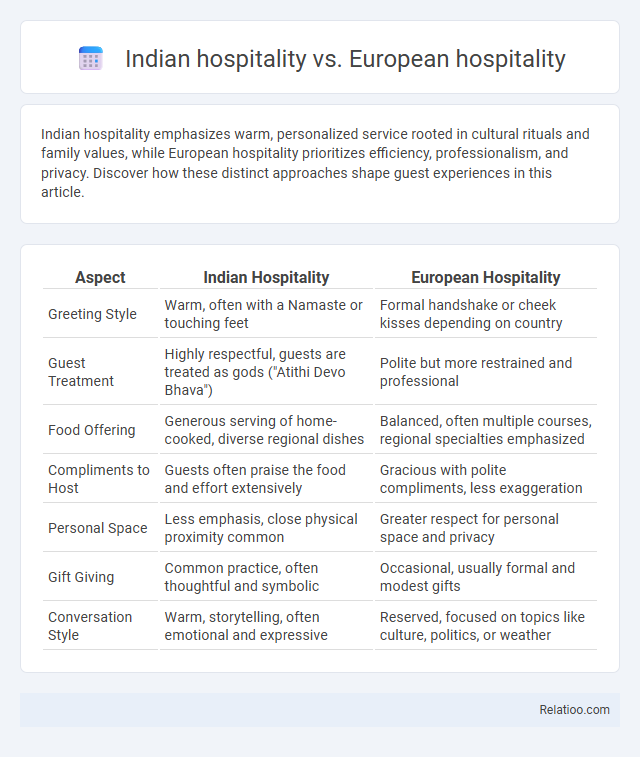Indian hospitality emphasizes warm, personalized service rooted in cultural rituals and family values, while European hospitality prioritizes efficiency, professionalism, and privacy. Discover how these distinct approaches shape guest experiences in this article.
Table of Comparison
| Aspect | Indian Hospitality | European Hospitality |
|---|---|---|
| Greeting Style | Warm, often with a Namaste or touching feet | Formal handshake or cheek kisses depending on country |
| Guest Treatment | Highly respectful, guests are treated as gods ("Atithi Devo Bhava") | Polite but more restrained and professional |
| Food Offering | Generous serving of home-cooked, diverse regional dishes | Balanced, often multiple courses, regional specialties emphasized |
| Compliments to Host | Guests often praise the food and effort extensively | Gracious with polite compliments, less exaggeration |
| Personal Space | Less emphasis, close physical proximity common | Greater respect for personal space and privacy |
| Gift Giving | Common practice, often thoughtful and symbolic | Occasional, usually formal and modest gifts |
| Conversation Style | Warm, storytelling, often emotional and expressive | Reserved, focused on topics like culture, politics, or weather |
Introduction to Indian and European Hospitality
Indian hospitality is deeply rooted in cultural traditions emphasizing warmth, generosity, and personalized service, often characterized by a spiritual approach known as "Atithi Devo Bhava," which means "Guest is God." European hospitality, meanwhile, prioritizes efficiency, professionalism, and a blend of classic and contemporary luxury, shaped by diverse regional customs and historical influences. Your experience can vastly differ in these two settings, where Indian hospitality offers immersive cultural warmth, and European hospitality delivers structured elegance and innovation.
Historical Roots of Hospitality in India and Europe
Indian hospitality traces its origins to ancient Vedic traditions emphasizing "Atithi Devo Bhava," meaning the guest is akin to God, reflecting a deeply spiritual and communal approach to welcoming visitors. European hospitality evolved from Greco-Roman customs combined with medieval Christian values, prioritizing the protection of travelers, often via monasteries and inns that served as safe havens. The historical roots of hospitality in both regions highlight contrasting yet profound cultural commitments: Indian hospitality centers on sacred duty and familial warmth, while European hospitality developed through formalized social institutions aimed at traveler safety and service.
Cultural Values Shaping Guest Experiences
Indian hospitality emphasizes the concept of "Atithi Devo Bhava," treating guests as divine beings, which creates deeply personal and warm experiences rooted in generosity and respect. European hospitality often highlights professionalism, efficiency, and refined service standards, reflecting a culture that values structure and tradition in guest interactions. Your understanding of hospitality can be enriched by recognizing how these cultural values shape personalized versus formal guest experiences worldwide.
Greeting Traditions: Namaste vs. Handshake
Indian hospitality centers around the traditional greeting of "Namaste," where hands are folded together and a slight bow is made, symbolizing respect and spiritual connection. European hospitality typically features a handshake, conveying professionalism and cordiality through physical contact. Understanding these greeting traditions enhances your cultural awareness and fosters meaningful interactions in diverse hospitality settings.
Service Styles: Personalized vs. Professional
Indian hospitality emphasizes personalized service styles that focus on warmth, attentiveness, and creating a homely atmosphere tailored to Your individual needs. European hospitality often leans toward professional service, maintaining formality and efficiency while ensuring high standards of guest comfort. Understanding these distinctions helps tailor experiences where Indian hospitality excels in emotional connection, and European hospitality prioritizes structured service efficiency.
Culinary Hospitality: Indian Feasts vs. European Dining
Indian culinary hospitality is characterized by lavish feasts featuring a diverse array of spices, aromatic curries, and extensive use of vegetarian and non-vegetarian dishes served in community-style meals that emphasize abundance and sharing. European dining, especially in Mediterranean and French traditions, prioritizes structured courses with a focus on quality ingredients, wine pairings, and regional specialties that balance flavor and presentation. Both Indian and European hospitality showcase cultural values through food, yet Indian feasts highlight social bonding and ritualistic hospitality while European dining emphasizes refinement and culinary technique.
Guest-Host Relationship Dynamics
Indian hospitality emphasizes deep personal connections and the concept of "Atithi Devo Bhava," treating guests as divine beings, creating a warm, familial atmosphere. European hospitality often balances professionalism with courtesy, focusing on efficiency and formal respect while maintaining personalized service tailored to guests' preferences. Your experience in Indian hospitality fosters emotional bonding, whereas European hospitality highlights refined etiquette and structured guest-host dynamics.
Rituals, Customs, and Symbolism in Hosting
Indian hospitality emphasizes elaborate rituals such as offering guests aarti and touching their feet as a sign of respect, symbolizing warmth and reverence deeply rooted in cultural customs. European hospitality, while more understated, focuses on gestures like offering a welcome drink or a formal toast, reflecting traditions of politeness and social etiquette. Your experience as a guest varies as Indian hosting embodies spiritual symbolism and communal bonding, whereas European hospitality highlights refined manners and individual comfort.
Modern Hospitality Trends: India and Europe Compared
Modern hospitality trends in India emphasize personalized and culturally immersive experiences, leveraging technology like mobile check-ins and AI-driven services to enhance guest satisfaction. European hospitality prioritizes sustainability, eco-friendly practices, and seamless digital integration, with many hotels adopting green certifications and smart room controls. To elevate your travel experience, understanding these regional nuances allows you to choose accommodations that align with your preferences for innovation and tradition.
Conclusion: Bridging Traditions in Global Hospitality
Indian hospitality emphasizes warmth, personalized service, and deep cultural rituals, while European hospitality often prioritizes efficiency, luxury, and formality. Global hospitality combines these strengths by integrating emotional connection with professional standards, creating a seamless guest experience. Bridging traditions fosters innovation, enriches diversity, and sets a new benchmark for worldwide hospitality excellence.

Infographic: Indian hospitality vs European hospitality
 relatioo.com
relatioo.com